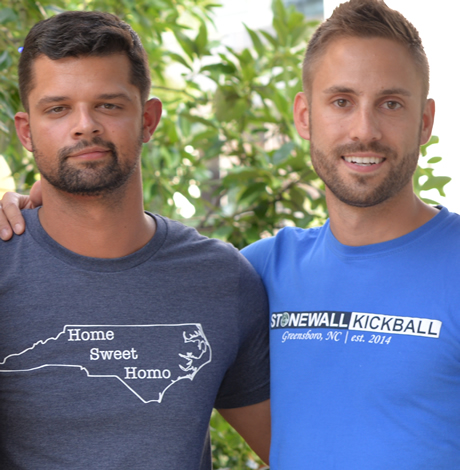Sports
LGBT sports leagues thriving in N.C. after HB2
Businesses offer support as protest against discriminatory law


The four Stonewall commissioners from North Carolina, from left, Jonathan Melton, Jason Boone, Frank Wolfgram and Will Fisher converge on D.C. for the Stonewall Sports Festival last month. (Blade photo by Michael Key)
Last August, the Washington Blade reported on the successful launch of Stonewall Sports franchises in two small cities in North Carolina. Their success, despite having small populations, was a result of good leadership and community support.
Earlier this year, North Carolina passed a law known as HB2 that strikes down local LGBT anti-discrimination laws. North Carolina Gov. Pat McCrory has repeatedly defended the law, which is being challenged in court.
The effects are wide-ranging and include banning transgender people from accessing restrooms and other facilities consistent with their gender identity and blocking local governments from protecting LGBT people against discrimination in a variety of areas.
The economic fallout has included musicians cancelling concerts and the NBA pulling its All-Star game from the state. The economic impact of all of this has been estimated at well over $100 million, according to experts.
The Blade revisited the cities of Wilmington and Greensboro along with two larger cities, Raleigh and Charlotte, to discover the impact of what is referred to by all of the teams as ‘Hate Bill 2.’
Stonewall Raleigh launched in 2013 and has exploded into a multi-sport giant with 1,000 athletes. It is offering leagues in kickball, dodgeball, volleyball, bowling and flag football along with a running club.
“All you really feel here is the backlash against the bill,” says Raleigh Commissioner Jonathan Melton. “People actually became kinder and it spurred more support for the LGBT community.”
Melton, who plays in five of the leagues, says that when you walk down the street in Raleigh, you see signs in almost every window opposing the bill. A favorite among the players is one that says ‘Everyone welcome except Pat McCrory.’
The Raleigh leagues are supported mainly by straight bars and restaurants and their support has increased and included fundraisers and vigils for the Orlando shooting victims.
“We live in a more progressive bubble here in Raleigh,” Melton says. “Several of the bars here changed to gender-neutral bathrooms after HB2.”
Stonewall Charlotte began in 2014 and is now offering kickball, dodgeball, bowling and volleyball to close to 800 athletes. There has been an elected official such as the mayor or city council members at every event where they have had a presence.
“This is a divided state because we are in the heart of the Bible Belt,” says Charlotte Commissioner Jason Boone. “Some people are going to stick to their religion and not ride the social wave. HB2 has been a constant weight hanging over North Carolina.”
Most of the sponsors in Charlotte are LGBT themed and there has been an uptick from organizations looking to partner with Stonewall on community events.
They have recently been involved in a tampon drive for women’s shelters and have created Stonewall meet-ups for things such as yoga, fitness boot camps, self-defense and flower arranging.
“We want to use our structure and framework to create events that give back to our community,” Boone says. “Sometimes it is as simple as just making a connection.”
When Stonewall Greensboro kicked off in 2014 it struggled with recruiting new players and the teams were small. What they didn’t struggle with was sponsorship and support from the local community.
“Not too much has changed after HB2,” says Greensboro commissioner, Will Fisher. “We have been able to hold a few anti-HB2 fundraising events with proceeds going to local LGBT organizations.”
Now at 148 players in their kickball league, Stonewall Greensboro has been interested in adding volleyball but is still vying for space in the area and facing high costs.
“We had some really nice silent auction things happen recently as local businesses stepped up their support,” Fisher says. “I really wanted them to flex their guns for us and am so happy that they came through.”
The smallest North Carolina city to host a Stonewall league, Stonewall Wilmington, is receiving donations from businesses just to spite HB2. Ironically, the biggest challenge that has faced them this year has been finding someone who has a key to the bathrooms on the city fields.
Created in 2015, Wilmington has 260 players in kickball and volleyball though the numbers fluctuate due to the tourist nature of the town.
“When I reach out to businesses for sponsorship they tend to cite HB2 as a reason for their donation or why they want to help the community,” says Wilmington Commissioner Frank Wolfgram.
Receiving more monetary sponsorships in the face of HB2 is one thing, but one organization actually changed its policy in a show of support.
“The volleyball facility that is hosting our league, Capt’n Bill’s has waived their standard requirement that all teams be co-ed,” Wolfgram says. “They didn’t want to discriminate against the LGBT community.”

More than a dozen LGBTQ athletes won medals at the Milan Cortina Winter Olympics that ended on Sunday.
Cayla Barnes, Hilary Knight, and Alex Carpenter are LGBTQ members of the U.S. women’s hockey team that won a gold medal after they defeated Canada in overtime. Knight the day before the Feb. 19 match proposed to her girlfriend, Brittany Bowe, an Olympic speed skater.
French ice dancer Guillaume Cizeron, who is gay, and his partner Laurence Fournier Beaudry won gold. American alpine skier Breezy Johnson, who is bisexual, won gold in the women’s downhill. Amber Glenn, who identifies as bisexual and pansexual, was part of the American figure skating team that won gold in the team event.
Swiss freestyle skier Mathilde Gremaud, who is in a relationship with Vali Höll, an Austrian mountain biker, won gold in women’s freeski slopestyle.
Bruce Mouat, who is the captain of the British curling team that won a silver medal, is gay. Six members of the Canadian women’s hockey team — Emily Clark, Erin Ambrose, Emerance Maschmeyer, Brianne Jenner, Laura Stacey, and Marie-Philip Poulin — that won silver are LGBTQ.
Swedish freestyle skier Sandra Naeslund, who is a lesbian, won a bronze medal in ski cross.
Belgian speed skater Tineke den Dulk, who is bisexual, was part of her country’s mixed 2000-meter relay that won bronze. Canadian ice dancer Paul Poirier, who is gay, and his partner, Piper Gilles, won bronze.
Laura Zimmermann, who is queer, is a member of the Swiss women’s hockey team that won bronze when they defeated Sweden.
Outsports.com notes all of the LGBTQ Olympians who competed at the games and who medaled.
Sports
US wins Olympic gold medal in women’s hockey
Team captain Hilary Knight proposed to girlfriend on Wednesday

The U.S. women’s hockey team on Thursday won a gold medal at the Milan Cortina Winter Olympics.
Team USA defeated Canada 2-1 in overtime. The game took place a day after Team USA captain Hilary Knight proposed to her girlfriend, Brittany Bowe, an Olympic speed skater.
Cayla Barnes and Alex Carpenter — Knight’s teammates — are also LGBTQ. They are among the more than 40 openly LGBTQ athletes who are competing in the games.
The Olympics will end on Sunday.
Sports
Attitude! French ice dancers nail ‘Vogue’ routine
Cizeron and Fournier Beaudry strike a pose in memorable Olympics performance

Madonna’s presence is being felt at the Olympic Games in Italy.
Guillaume Cizeron and his rhythm ice dancing partner Laurence Fournier Beaudry of France performed a flawless skate to Madonna’s “Vogue” and “Rescue Me” on Monday.
The duo scored an impressive 90.18 for their effort, the best score of the night.
“We’ve been working hard the whole season to get over 90, so it was nice to see the score on the screen,” Fournier Beaudry told Olympics.com. “But first of all, just coming out off the ice, we were very happy about what we delivered and the pleasure we had out there. With the energy of the crowd, it was really amazing.”
Watch the routine on YouTube here.

















